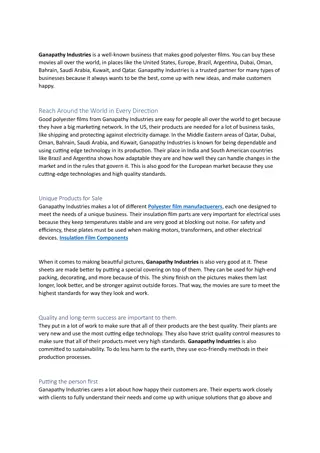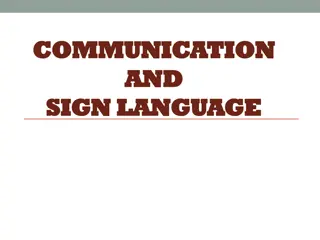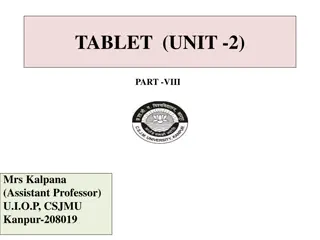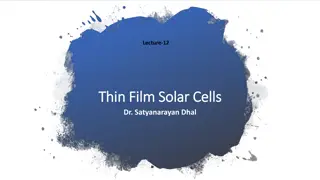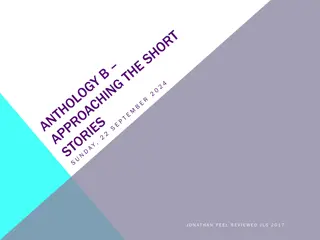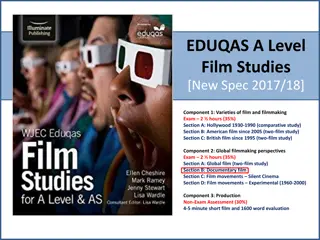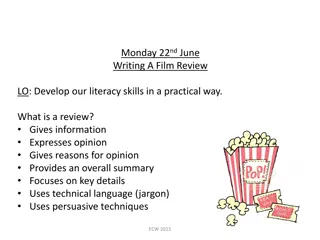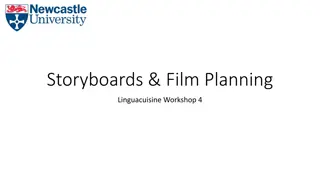Exploring Language and Communication Through a Short Film
In this lesson, students will watch a 10-minute short film titled "The Most Beautiful Thing" by Cameron Covell. They will reflect on the value of learning another language, analyze how facial expressions and body language convey emotions, and develop empathy towards those facing language barriers or disabilities. Through an anticipation exercise and discussing statements related to communication, students will explore the importance of language learning and communication. The film showcases that effective communication transcends language barriers and emphasizes the significance of understanding and empathy.
Download Presentation

Please find below an Image/Link to download the presentation.
The content on the website is provided AS IS for your information and personal use only. It may not be sold, licensed, or shared on other websites without obtaining consent from the author. Download presentation by click this link. If you encounter any issues during the download, it is possible that the publisher has removed the file from their server.
E N D
Presentation Transcript
The Most Beautiful Thing A Cameron Covell (short film)
Aims and objectives of this lesson; Students will have reflected on the value of learning another language. Look at a short film of 10 minutes and discuss its content and meaning. Identify ways in which facial expression and body language communicates emotions, thoughts and feelings. Foster empathy towards people who struggle to speak English or who have a disability. Implement a growth mindset regarding learning language.
Abbreviations T.L. = Target Language Your target language could be French, German, Italian or Spanish or any other foreign language you wish to learn now or in the future.
A little about the short film you are about to watch ..
Do you agree or disagree with each of the following statements? 1. A deaf person can never learn to speak . 2. I can communicate in the T.L. even if I make mistakes . 3. Body language and gestures are not important when communicating in my T.L. 4. Modern technology can open up doors of communication for deaf people . 5. There is no need to learn a foreign language once you can speak English.
https://www.youtube.com/watch? v=IP8psM4LWXk Click on link above to watch the short film. It will last 10 minutes and 44 seconds.
1. A deaf person can never ever learn to speak . Disagree . Many deaf people do learn to speak, and they communicate very effectively through sign language. They speak through their hands and gestures.
2. I can communicate in the T.L. even if I make mistakes . Agree Both of the main characters learn a little of the persons first language and communicate well even if they made mistakes. Think of examples in real life.
3. Body language and gestures are not important when communicating in my T.L . Disagree . Most of our communication is in fact through body language, facial expressions, tone of voice and not always through our words. Discuss examples in real life.
4. Modern technology can open up doors of communication for deaf people . Agree . In the film the protagonists communicate well through text. A phone call in this case would be much more difficult. Can you think of other ways new technology can be used to help others?
5. There is no need to learn a foreign language once you can speak English. Disagree . While English is a very widely spoken language, not everyone speaks it. Having proficiency in another or more foreign languages is great for ones career. It sharpens one s mind and thus health, broadens one s cultural and travel horizons, develops confidence, understanding and helps deepen relationships with others. Knowing what it is like to learn another language develops empathy with how foreigners struggle with English in our communities.
Can you remember what the protagonists name was? Can you describe what the protagonist looks like in your T.L.?
He likes and eventually invites a girl to the prom, can you remember what her name was? Make 3 statements in your T.L. about her.
When another boy kisses the protagonist s love interest, he drops (a) A bunch of roses (b) A box of Chocolates ( c) A bag of books
When another boy kisses the protagonist s love interest, he drops (a) A bunch of roses (b) A box of Chocolates ( c) A bag of books
What colour are the roses? (a) Dark Red (b) White and yellow ( c) Yellow and Orange
What colour are the roses? (a) Dark Red (b) White and yellow ( c) Yellow and Orange
Helen Keller was an American author political activist and lecturer. She was the first deaf blind person to earn a bachelor of arts degree. Look her up and tell the class next time what you learned.
Can you give examples of beautiful things in the world that Helen Keller may be talking about?
Can you give examples of beautiful things in the world that cannot be seen? cannot be heard? cannot be touched? Here are some examples Beautiful things that cannot be seen? Music and the sound of my mothers voice. Beautiful things that cannot be heard? Sunshine and grass. Beautiful things that cannot be touched? Love and kindness.
From your list of things that you think are beautiful in the world, can you translate any two into your T.L.? Use a dictionary to help you.
Can you translate Helen Kellers statement into your T.L.? Words I know in my T.L. Words I am unsure about in my T.L. .. Words I don t know in my T.L. .
Make any 3 statements inspired by or about the short film. What did you learn? What did you like about the film?
Here are some phrases to help you with your reflection. I learned that . I am reminded of how .. It s true / not true that .. I think it is . I believe one should never .. I like I assumed that .
Here are some personal reactions and reflections by other students in another school. I learned that its mean to laugh at other peoples mistakes. Never snigger at peoples effort to speak a foreign language. I liked the film where the boy and girl use gestures and facial expressions to say a lot. I assumed that at the start of the film the young girl ignores him but she is in fact deaf. We can often assume things about other people that are wrong.
Here are some personal reactions of a teacher in another school. Avoid a fixed mindset I am no good at languages . I can t do it . Everyone can improve even by one step at a time. Encourage a growth mind set by always asking yourself; what one thing did I learn? What one thing did I do to improve? What one thing will I do next time? It s important not to compare yourself to others.







